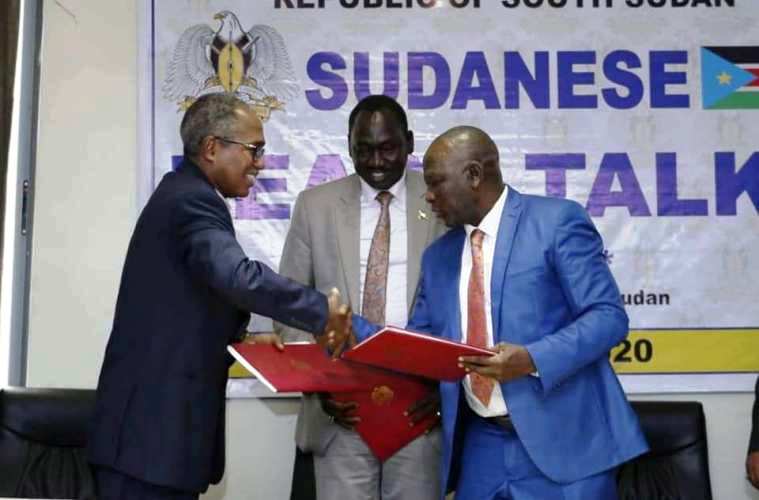Sudan, SPLM-N Agar initial Political Document ahead of final peace agreement

The text was endorsed by Hassan Nasrallah, member of the government delegation, Abdallah Eisa Zayed for the SPLM-N Agar and Dhieu Matouk for the mediation.
The agreement included the system of government in the Two Areas, boundaries of the states of Blue Nile, South and West Kordofan, Nuba Mountains area, wealth and power-sharing, phases of security arrangements, identity, and representation of women.
The SPLM-N Agar called for a large regional autonomy during the peace negotiations saying it will join the other democratic forces during the constitutional conference to establish a secular state in Sudan.
The SPLM-N al-Hilu refuses to engage in talks to end the armed conflict in the Two Areas unless the government accept to include the secular state and the right to self-determination in the agenda of the negotiations.
For its part, the government said ready to negotiate on everything except the territorial integrity adding that the issue of the secular state will be decided by the constitutional conference with the participation of the revolution’s forces and not at the peace talks with a single group.
Ismail al-Taj, a member of the government delegation to the peace negotiations, told reporters that signing of the document on issues of governance, powers and powers in the two regions represented a fundamental step in the path of achieving peace in Sudan.
Al-Taj who is a leading member of the Sudanese Professional Association further reiterated the determination of the parties to achieve peace and to end the war in the country adding they are on the verge to sign a peace agreement with the armed groups of the SRF.
Yasir Arman, SPLM-N Agar Deputy Chairman, said that the rights granted by the Political Document for the people of the Two Areas had not even been ensured by the Naivasha peace agreement of 2005.
He further stressed that the Sudanese Revolutionary Front (SRF) decided to end the armed action and return to Khartoum to continue achieving national goals through political action and a bold partnership with the military and civilians components of the Transitional Authority.
In the same vein, the SRF leader al-Hadi Idris reaffirmed the SRF’s commitment to reach a final peace agreement before the ninth of April, the date set by the mediation.
He also pointed out that talks between the government and Darfur groups continue with the same spirit to achieve peace in the whole Sudan.
The government and the SPLM-N Agar have already signed a humanitarian agreement which is now effective on the grounds, a framework agreement dealing with the issues of democracy and equal citizenship, governance, power-sharing, wealth distribution and security arrangements.
The national issues, including power structures at the national level, wealth sharing, the national capital, civil service, the SRF participation in Transitional Authority (Sovereign Council and Government), foreign policy, the National Constitutional Conference, and other issues will be discussed at the end of the negotiation before to be added to the final peace agreement.
South Sudan’s Chief Mediator Tut Kew Gatluak said that Juba will witness soon the signing of the peace agreement between the Sudanese government and the SRF.
Gatluak added they already prepare the organization of the signing ceremony and how to receive the Sudanese and foreign delegations for this big event.
(ST)
